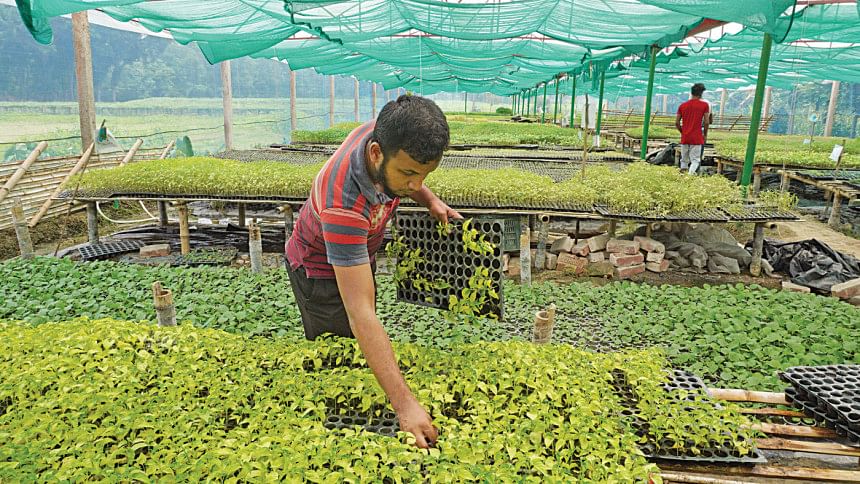Custom greenhouse enables faster yields

Imagine neat rows of vegetable saplings in the thousands growing in a temperature and humidity controlled environment fitted with drip irrigation and free from pests, capable of providing harvests 15 days in advance.
What was mostly on trial is now in practice some 200 kilometres southwest of Dhaka by the Jashore-Jhenidah highway.
Maxim Agro sits in Jashore sadar upazila near Churamankati Bazar.
Its primary operations encompass four sheds on a piece of land just shy of a football field in size.
Each of these sheds are custom greenhouses, with concrete pillars holding up green netting for walls, allowing air to move freely yet keeping out the pests.
The top is made up of a steel frame covered with UV resistant clear poly film, which, in other words, allows just the right amount of light and heat.
Inside, on bamboo platforms sit custom plastic trays, each capable of holding 104 seedlings, alongside tea pots for the same purpose.
But what makes this farm stands out the most is its use of coco peat or coco dust instead of soil to turn seeds into saplings, which they say enable harvests 15 days in advance.
This was confirmed by Samaul Islam, a farmer of Bhagalpur village under Haibatpur union in Jashore Sadar upazila.
He said the price of the seedlings were almost double that sold in local markets.
But the cabbage he cultivated was ready for harvest 15 days in advance last season, he said.
This was for the germination carried out in coco peat, he said, adding that the success rate in germination was over 90 per cent.
"I benefited in both ways, first for early yielding and second for the success rate of seedling survival," said Samaul.
Md Tauhidul Islam, director of an agricultural project of Jagorani Chakra Foundation, a corporate client of the farm, said they distributed these seedlings among their 600 beneficiaries and got good feedback.
Selling the saplings at twice the market rate has not stopped the farm from reaching break-even and then to profit in just three years of operations.
Last year the farm sold around one crore seedlings, said its business manager, MD Beplob Hossen.
"In this greenhouse, temperature and humidity are controlled. Excess sunlight and temperature are not suitable for vegetable seed germination and growing seedlings," he said.
"So the environment inside the shed is cooler than that outside," he added.
Now the farm germinates 32 varieties of vegetable seedlings, including that of tomato, yellow watermelon, papaya, chilli, brinjal, gourd, capsicum, squash and cabbage.
It is also working on producing black sugarcane and corpus cotton seedlings, said Biplob.
The farm also sells mulch film, seedling trays, growing media such as coco dust, UV poly film, green and black nets, drip irrigation etc.
Mulch film are used to modify soil temperature, limit weed growth, prevent moisture loss, and improve crop yield as well as precocity.
The owner, Md Shariful Amin, hailing from Naogaon and now residing in Dhaka, has two more similar operations in Meherpur and Bogura.
"I had a cherished desire for an uncommon nursery from my childhood," he told our Jhenidah correspondent over the phone.
"After visiting a vegetable seedling farm in India, my childhood dream revived in my mind and at the end of 2018, I started this agro farm," he said.
Though this farming method was very costly, the output was good while it also provided employment opportunities, he said.
Some 10 women are said to be employed to carry out the planting.
Mohammad Hamidur Rahman, a former director general of the Department of Agricultural Extension, said seedling production using UV poly film was practiced in Bogura on a small scale by some farmers.
However, this type of seedling production on an industrial scale is a new concept in Bangladesh, he said.
They can deliver quality seedlings in any parts of the country and this is good for the country's agriculture, he said.

 For all latest news, follow The Daily Star's Google News channel.
For all latest news, follow The Daily Star's Google News channel. 



Comments